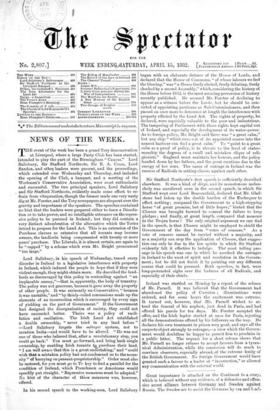In his second speech to the working-men, Lord Salisbury began
with an elaborate defence of the House of Lords, and. declared that the House of Commons, "of whose labours we feel the blessing," was "a House freely elected, freely debating, freely checked by a second Assembly," which, considering the history of the House before 1832, is the most amazing perversion of history • recently published. He accused Mr. Forster of declining to appear as a witness before the Lords, lest he should be con- victed of appointing partisans as Sub-Commissioners, and then passed on once more to denounce at length the interference with property effected by the Land Act. The rights of property, he declared, were especially valuable to the poor and industrious. The tampering of Parliament with those rights kept capital out of Ireland, and especially the development of its water-power. As to foreign policy, Mr. Bright said there was "a great calm," but any ship "which runs oat of its appointed course into the- nearest harbour can find a great calm." To "point to a great calm as a proof of policy, is to elevate to the level of states- manship the dogmas of a small and mistaken clique of reli- gionists." England must maintain her honour, and the policy handed down by her fathers, and the great creations due to the energy of her sons. The cause of outrage in Ireland was the success of Radicals in setting classes against each other.


































